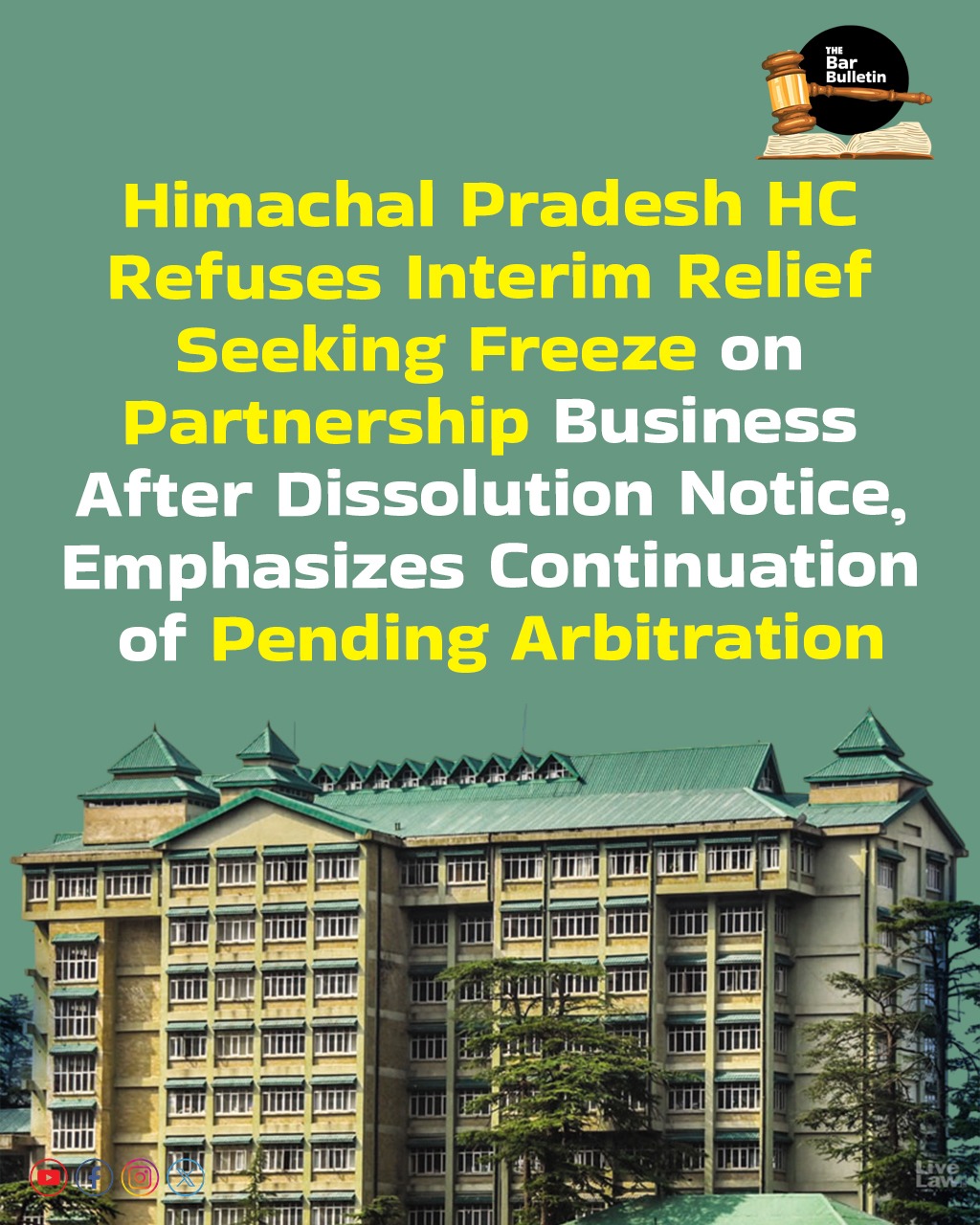The Himachal Pradesh High Court dismissed the petitioner’s request for interim reliefs restraining the respondent from carrying on the dissolved partnership business and refused to appoint a receiver, allowing the business to continue until arbitration.
The petition was filed by Nitin Gupta under Section 9 of the Arbitration and Conciliation Act, seeking restraint on Arrpit Aggarwal and his agents from conducting business operations of M/s Vidhyasha Pharmaceuticals post alleged dissolution of the partnership firm, along with closure of production, freezing bank accounts, and appointment of a receiver. The petitioner relied on Sections 43, 46, 47, and 53 of the Indian Partnership Act, 1932, claiming that the partnership stood dissolved and the respondent had no right to operate the business.
M/s Vidhyasha Pharmaceuticals was a partnership firm formed in 2014, reconstituted in 2015 between the petitioner and respondent, both holding 50% shares. Irreconcilable differences led to the petitioner issuing a Dissolution Notice on 26 May 2025, which was later published in newspapers.
Petitioner alleged mismanagement and diversion of business by respondent, arguing that the partnership was “at will” under Clause 10 and dissolution notice sufficed for dissolution. The respondent disputed unilateral dissolution citing Clause 8 which required mutual consent for dissolution, making the partnership not “at will.”
The Bench comprising Justice Jyotsna Rewal Dua noted that the firm was a running concern with over 100 employees and multiple licenses, and sudden shutdown would cause irreparable harm. It referenced precedents to emphasize the protection of subject matter of arbitration and the necessity of balancing interim relief with business continuity.The Court found that the arbitration agreement between the parties, as embodied in Clause 13 of the partnership deed dated 6 January 2015 require arbitration to determine dissolution, therefore a unilateral declaration by the petitioner was not sufficient for interim relief.
Commenting on the reliance of the petitioner on Sections 43, 46, 47, and 53 of the Partnership Act, the Court clarified that these provisions allow restraint on business use post-dissolution but only after proper dissolution is adjudicated.
The Court dismissed the petitioner’s petition for interim injunction restraining the respondent from operating the partnership firm or alienating its assets. The Court protected the firm’s ongoing operations to avoid irreparable loss to employees and the business, while safeguarding the petitioner’s interests by prohibiting alienation of assets and mandating strict accounting.
The petitioner was granted liberty to pursue claims before the arbitrator. All interim orders were vacated, and the parties were directed to respect the partnership’s operational integrity during dispute resolution. Observations were limited to interim relief and would not affect merits of the dispute.
Cases relied on:
1. Adhunik Steels Ltd. vs. Orissa Manganese & Minerals (P) Ltd., (2007) 7 SCC 125
2. Firm Ashok Traders & Anr. vs. Gurumukh Dass Saluja & Ors., (2004) 3 SCC 155
3. M.O.H. Uduman & Ors.. vs. M.O.H. Aslum, (1991) 1 SCC 412
4. Karumuthu Thiagarajan Chettiar & Anr. vs. E.M. Muthappa Chettiar, AIR 1961 SC 1225
5. Arvind Constructions (P) Ltd. vs. Kalinga Mining Corporation & Ors., (2007) 6 SCC 798
6. Arcelor Mittal Nippon Steel India Ltd. vs. Essar Bulk Terminal Ltd., (2022) 1 SCC 712
Appearances:
For the Petitioner: Mr. Mohit Chadha, Advocate (through Video Conference) and Mr. Shubham Sood, Advocate.
For the Respondent: Mr. Desh Raj Thakur & Mr. Ravneet Kumar, Advocates



